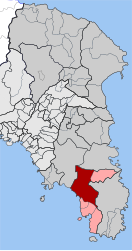Kalyvia Thorikou (Greek: Καλύβια Θορικού) is a town and a former municipality in East Attica, Greece. Since the 2011 local government reform it is part of the municipality Saronikos, of which it is the seat and a municipal unit.[2] The municipal unit has an area of 70.636 km2.[3] The town has historically been an Arvanite settlement.[4]
Kalyvia Thorikou
Καλύβια Θορικού | |
|---|---|
| Coordinates: 37°50′N 23°55′E / 37.833°N 23.917°E | |
| Country | Greece |
| Administrative region | Attica |
| Regional unit | East Attica |
| Municipality | Saronikos |
| Area | |
| • Municipal unit | 70.636 km2 (27.273 sq mi) |
| Elevation | 110 m (360 ft) |
| Population (2021)[1] | |
| • Municipal unit | 15,486 |
| • Municipal unit density | 220/km2 (570/sq mi) |
| Time zone | UTC+2 (EET) |
| • Summer (DST) | UTC+3 (EEST) |
| Postal code | 190 10 |
| Area code(s) | 22990 |
| Vehicle registration | Z |
| Website | www.kalivia.gr |
Geography edit
Kalyvia Thorikou consists of two distinct parts: the main inland town Kalyvia and the coastal settlement, which is also referred to as Lagonisi. Kalyvia proper is situated on the south side of the Mesogaia plain, in the southeastern part of the Attica peninsula. There are several low mountains around Kalyvia Thorikou, including Mount Paneion to its south and Merenta to its northeast. Kalyvia Thorikou is 7 km northeast from the Saronic Gulf coast at Lagonisi, 5 km south of Markopoulo Mesogaias, 6 km northwest of Keratea and 24 km southeast of Athens city centre. The Greek National Road 89 (Gerakas - Koropi - Lavrio - Sounio) passes east of the town.
Notable people edit
- Athena Manoukian, singer
Sister cities edit
See also edit
References edit
- ^ "Αποτελέσματα Απογραφής Πληθυσμού - Κατοικιών 2021, Μόνιμος Πληθυσμός κατά οικισμό" [Results of the 2021 Population - Housing Census, Permanent population by settlement] (in Greek). Hellenic Statistical Authority. 29 March 2024.
- ^ "ΦΕΚ B 1292/2010, Kallikratis reform municipalities" (in Greek). Government Gazette.
- ^ "Population & housing census 2001 (incl. area and average elevation)" (PDF) (in Greek). National Statistical Service of Greece. Archived from the original (PDF) on 2015-09-21.
- ^ Pantelidis, Nikos; Liosis, Nikos (2019). "Dialectical Modern Greek Influences on Arvanitika". Modern Greek Dialects and Linguistics Theory. National and Kapodistrian University of Athens: 224.
External links edit
- Official website (in English and Greek)
- news

